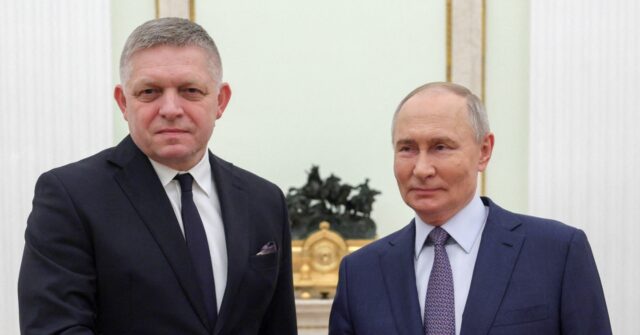Russian President Vladimir Putin recently met with Slovakia’s Prime Minister Robert Fico in the Kremlin—marking a notable occurrence, as this event is one of the few instances of an EU leader visiting Moscow since Russia’s invasion of Ukraine began in February 2022. Fico’s “working visit” exemplifies Slovakia’s political engagement amid the ongoing geopolitical tensions. According to Kremlin spokesman Dmitry Peskov, the discussions aimed to address various aspects of the “international situation” along with concerns regarding Russian natural gas supplies. This engagement highlights the complex dynamics within European Union member states as they navigate their diplomatic relationships with Russia, particularly in light of ongoing sanctions and energy dependence.
The visit is significant, as interactions between Russian officials and European leaders have largely diminished since the escalation of the Ukrainian conflict. While there have been few exceptions, such as Hungarian Prime Minister Viktor Orban’s visit to Russia in July, these encounters often attract criticism from other EU nations and Ukraine. Orban’s trip faced backlash for appearing to normalize relations with Russia during a time when many European leaders advocate for isolation and sanctions against Moscow. Such visits can lead to strained relations and diverging diplomatic approaches within the European Union, which has been juggling solidarity against Russian aggression and individual member states’ energy needs and foreign policy priorities.
Slovakia’s engagement with Russia could raise questions about broader EU unity and coherence in response to Russia’s aggression. The varying degrees of willingness among EU leaders to engage with Moscow reflect differing national interests and historical ties. Slovakia, like many other Central and Eastern European countries, has been significantly affected by the war in Ukraine, notably in terms of energy supply and security policies. As European nations grapple with the consequences of reduced energy imports from Russia, leaders like Fico might leverage dialogue in hopes of stabilizing energy relationships, despite the potential diplomatic repercussions.
The timing of Fico’s visit can also be contextualized against the backdrop of Slovakia’s political landscape, which has recently experienced growing tensions over energy dependencies and foreign policy directions. Prime Minister Fico, who has previously shown a willingness to engage with Russia, may be responding to domestic pressures and public sentiment as the challenges of rising energy costs and economic stability weigh heavily on the populace. His discussions with Putin may aim at reassessing Slovakia’s energy strategies while navigating the pressures from both the EU and Russia.
Moreover, the Kremlin’s narrative surrounding this meeting emphasizes the importance of discussing energy deliveries, an issue that is not only vital for Slovakia but also for the wider European economy dealing with the energy crisis exacerbated by the war. The mention of natural gas in official communications indicates its central role in the discussions, highlighting the ongoing challenges faced by European nations in securing energy supplies without compromising their political stance against Russian aggression. The outcome of these talks could influence energy policies and bilateral relationships in the region.
In summary, Fico’s visit to Moscow sheds light on the intricate balance EU leaders are attempting to maintain between diplomatic engagement with Russia and solidarity against its military actions in Ukraine. This meeting underscores Slovakia’s potentially critical role in shaping regional energy policies while navigating internal and external pressures. The ramifications of such visits are complex, raising debates about the effectiveness of sanctions and the future of EU cohesion, especially as leaders continue to adapt to a rapidly evolving political landscape in response to ongoing hostilities and economic challenges.

